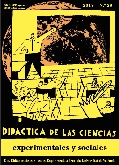Conceptions of the educational community on intangible cultural heritage and its didactic use: an exploratory analysis
DOI:
https://doi.org/10.7203/dces.44.26628Keywords:
Heritage education, conceptions, teachers, Ibero-America, identity Abstract
Abstract
Several studies have revealed an unequal valuation and didactic approach to intangible cultural heritage (ICH) among teachers in Latin America, Spain and Portugal. To obtain a comprehensive overview of the situation of ICH in Ibero-American education, this study aims to discover the conceptions that educators hold about this heritage typology, the didactic use they make of it and the problems they experience when teaching about it. This paper presents the preliminary results obtained from the responses of 52 teachers to a qualitative questionnaire. The data collected, analysed from Grounded Theory through a triple coding process, points to an asynchrony between the conceptions about ICH, mainly valued as a catalyst of identity bonds, and the didactic implementation of it, in which expositive methodologies prevail, disregarding the evaluative processes. It is concluded that the developed categories can specifically serve the heritage-educational understanding of the ICH, by obtaining a model of interpretation that diverges in some respects from previous theoretical frameworks.
 Downloads
Downloads
Downloads
Additional Files
Published
How to Cite
-
Abstract696
-
Carta de Autoría (Español)3
-
PDF (Español)630
Issue
Section
License
![]()
The articles published at Didáctica de las Ciencias Experimentales y Sociales will have a Creative Common Licence Creative Commons Attribution-Noncommercial-No Derivative Works 3.0 Unported



